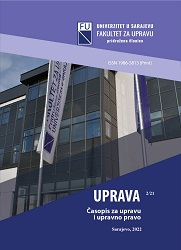Promoting Inclusive Society in the New Norm: A Lesson from Bosnia and Herzegovina
Promoting Inclusive Society in the New Norm: A Lesson from Bosnia and Herzegovina
Author(s): Emir Tahirović, Ermin Kuka, Rijad DelićSubject(s): Labor relations, Family and social welfare, Economic development, Inclusive Education / Inclusion, Socio-Economic Research
Published by: Fakultet za upravu, pridružena članica Univerziteta u Sarajevu
Keywords: society; social inclusion; social exclusion; marginalized categories; norms; disability;
Summary/Abstract: There are several issues and problems that are inevitably produced by the phenomenon and the emergence of social exclusion. These are, first of all: unemployment, inadequate education, extremely poor housing and an environment characterized by high rates of corruption and crime, insufficient and inadequate care and nursing of the elderly, low level of general health, cases of family breakdown, addiction problems, and discrimination on various grounds. Therefore, the fight against poverty and social exclusion, through the promotion of integration and inclusion in the labor market and social integration, supports marginalized groups and helps their active inclusion in social flows. The inclusion in the labor market of socially excluded groups, accompanied by projects to create a supportive environment, is particularly important and represents the best approach in their social reaffirmation and fight against all forms of social exclusion. In this sense, the development and implementation of social inclusion programs that are regulated by positive legal regulations by the state are crucial. It is the state that should, on the basis of legal regulation and through financial support, encourage social inclusion since this is the only way and basis to ensure the prevention of all forms of discrimination against socially excluded groups of citizens. In this context, the development and implementation of disability education programs are key. Support for such projects increases opportunities for education and subsequent employment and reduces the risk of social exclusion and poverty of socially excluded categories. The presented case study shows that the development and implementation of targeted inclusive education programs will give excellent results in terms of strengthening this marginalized category by improving the conditions of their education without physical and mental barriers, as well as by creating conditions for improving their later employment and labor market integration.
Journal: UPRAVA stručni časopis
- Issue Year: 2021
- Issue No: 25
- Page Range: 11-25
- Page Count: 15
- Language: English

